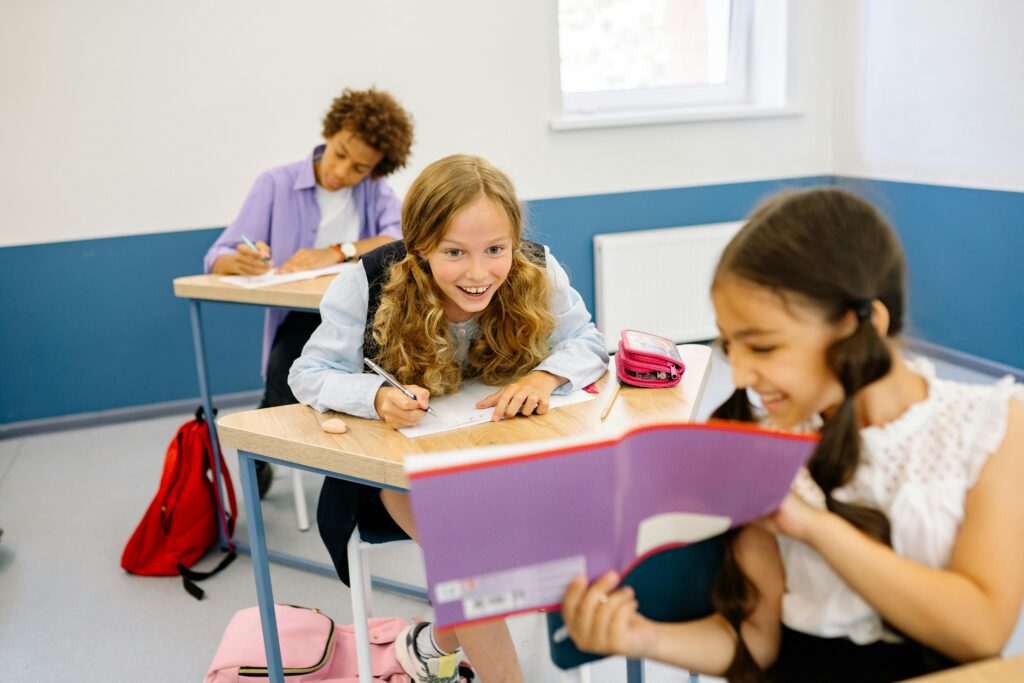
Spanish School Vocabulary
School is a common topic of conversation in Spanish. Whether you’re chatting about high school memories or your current classes, conversations about school are a great way to break the ice with anyone you meet.
In this post, I’ve compiled a list of 75 essential Spanish words about school to get you started.
Contents
Download: This blog post is available as a convenient and portable PDF that you can take anywhere. Click here to get a copy. (Download)
Basic Words
Before I start, an important grammar tip to remember is that the indefinite articles el (the) or la (the) are used before Spanish nouns. The plurals are los (the) and las (the), and they come in handy when using Spanish school words.
For example, school becomes la escuela (the school) in Spanish, although when translating it, it isn’t always necessary to add “the” into the English translation.
| Spanish | English | Example sentence |
|---|---|---|
| La escuela | The school | Me gusta la escuela.
(I like school.) |
| La primaria | The elementary school | Mi hermana está en la escuela primaria.
(My sister is in elementary school.) |
| La secundaria | The high school | Estoy en la escuela secundaria.
(I'm in high school.) |
| La universidad | The university | Mañana tengo que ir a la universidad.
(Tomorrow I have to go to university.) |
| La escuela de idiomas | The language school | La escuela de idiomas está en el centro de la ciudad.
(The language school is in the center of the city.) |
| La escuela de arte | The art school | Los martes voy a la escuela de arte.
(On Tuesdays I go to art school.) |
| El colegio internacional | The international school | La escuela internacional enseña cuatro idiomas.
(The international school teaches four languages.) |
| El colegio público | The public school | En esta ciudad hay ocho colegios públicos.
(In this city there are eight public schools.) |
| El colegio privado | The private school | El colegio privado era conocido por su amplia variedad de asignaturas.
(The private school was known for its wide variety of subjects.) |
| El colegio bilingüe | The bilingual school | El gobierno aprobó un nuevo fondo para apoyar a los colegios bilingües.
(The government approved a new fund to support bilingual schools.) |
| La clase | The class (location), class/lesson | ¿Dónde es la clase?
(Where is the class?) Me gusta mucho la clase. (I like the lesson very much.) |
| El comedor | The dining hall | ¿Dónde está el comedor?
(Where is the dining hall?) |
| La biblioteca | The library | Me encanta estudiar en la biblioteca con mis compañeros de clase.
(I love studying in the library with my classmates.) |
| El gimnasio | The gym | Suelo ir al gimnasio antes de ir a casa.
(I usually go to the gym before going home.) |
| El pasillo | The corridor | Ve por ese pasillo y gira a la izquierda para encontrar la biblioteca.
(Go down that corridor and turn left to find the library.) |
| El semestre | The semester | Estoy aquí por un semestre.
(I'm here for a semester.) |
| El curso | The course | Me dijeron que el curso es difícil y que hay que estudiar mucho.
(They told me that the course is difficult and that you have to study a lot.) |
| Los exámenes | The exams | Tengo que estudiar para mis exámenes.
(I have to study for my exams.) |
| Los grados | The grades | Nosotros estamos en diferentes grados.
(We're in different grades.) |
| El patio | The playground | Cuando no llueve, los niños salen al patio durante el recreo.
(When it doesn't rain, the children go out to the playground during recess.) |
Staff and students
| Spanish | English | Example sentence |
|---|---|---|
| El profesor | The professor/teacher (masculine) | Mi profesor de español es amable.
(My Spanish professor is kind.) |
| La profesora | The professor/teacher (feminine) | La profesora es una de las personas más inteligentes que conozco.
(The teacher is one of the smartest people I know.) |
| El director | The principal/headteacher (masculine) | El director envió un correo electrónico a todos los profesores.
(The principal sent an email to all of the teachers.) |
| La directora | The principal/headteacher (feminine) | Es directora del colegio desde hace un mes.
(She's been the principal of the school for a month.) |
| Los estudiantes / Los alumnos | The students | A los estudiantes les gusta hacer proyectos con sus compañeros de clase.
(The students like doing projects with their classmates.) |
| El estudiante / El alumno | The student (masculine) | El alumno camina a la escuela todos los días.
(The student walks to school every day.) |
| La estudiante / La alumna | The student (feminine) | La alumna lee en la biblioteca.
(The student reads in the library.) |
| El compañero de estudio | The study partner (masculine) | Mi compañero de estudio me prestó su calculadora.
(My study partner lent me his calculator.) |
| La compañera de estudio | The study partner (feminine) | Su compañera de estudio habla varios idiomas.
(His study partner speaks several languages.) |
| El estudiante de intercambio / La estudiante de intercambio | The exchange student (masculine/feminine) | El estudiante de intercambio es de Francia.
(The exchange student is from France.) |
Verbs
| Spanish | English | Example sentence |
|---|---|---|
| Explicar | To explain | ¿Me puedes explicar el problema de matemáticas? No lo entiendo.
(Can you explain the math problem to me? I don't understand it.) |
| Enseñar | To teach | Mi hermano quiere enseñar francés cuando se gradúe de la universidad.
(My brother wants to teach French when he graduates from university.) |
| Aprender | To learn | A todos nos encanta aprender otros idiomas.
(We all love learning other languages.) |
| Estudiar | To study | Normalmente estudio idiomas con mis compañeros de clase para que podamos hablar el idioma juntos.
(I normally study languages with my classmates so that we can speak the language together.) |
| Leer | To read | Debe aprender a leer en la escuela primaria.
(He must learn to read in elementary school.) |
| Escribir | To write | Es importante que aprendamos a escribir bien en español.
(It's important that we learn to write well in Spanish.) |
Subjects
| Spanish | English | Example sentence |
|---|---|---|
| La asignatura / La materia | Subject | Mi profesor me preguntó cuál era mi asignatura favorita.
(My teacher asked me what my favorite subject was.) |
| El arte | Art | Arte es mi clase favorita.
(Art is my favorite class.) |
| La ciencia | Science | Estudio mucho para los exámenes de Ciencia.
(I study a lot for science exams.) |
| La biología | Biology | Luca quiere estudiar Biología en la universidad.
(Luca wants to study biology at university.) |
| La física | Physics | Física es una de las asignaturas más difíciles, pero es muy interesante.
(Physics is one of the most difficult subjects, but it is very interesting.) |
| La química | Chemistry | Me gusta hacer experimentos en mis clases de Química.
(I like to do experiments in my chemistry classes.) |
| La geografía | Geography | La geografía es importante porque nos enseña sobre el mundo.
(Geography is important because it teaches us about the world.) |
| La historia | History | A mi hermana le fascina la clase de Historia.
(My sister is fascinated by history class.) |
| Las matemáticas | Mathematics | Nos cae bien nuestro profesor de Matemáticas porque es simpático y siempre explica todo muy bien.
(We like our math teacher because he's friendly and always explains everything very well.) |
| La música | Music | Me encanta aprender a tocar el piano en las clases de Música.
(I love learning to play the piano in music classes.) |
| El español | Spanish | Estudio español en la escuela con mis amigos.
(I study Spanish at school with my friends.) |
| El inglés | English | Estudio inglés en casa.
(I study English at home.) |
| El francés | French | Mi hermana va a una academia para estudiar francés.
(My sister goes to an academy to study French.) |
| La informática | Computer science | Siempre aprendo algo nuevo en Informática.
(I always learn something new in computer science.) |
| La religión | Religion | Religión es una asignatura obligatoria en mi escuela.
(Religion is a compulsory subject at my school.) |
| La filosofía | Philosophy | Mañana en la clase de Filosofía, tendremos un debate sobre los textos que hemos leído.
(Tomorrow in philosophy class, we will have a debate about the texts that we have read.) |
| El teatro | Drama | La estudiante siempre supo que quería estudiar Teatro en la universidad.
(The student always knew that she wanted to study drama at university.) |
Materials
| Spanish | English | Example sentence |
|---|---|---|
| El escritorio | The desk | Los escritorios en mi escuela son muy grandes.
(The desks at my school are very big.) |
| La silla | The chair | La escuela va a reemplazar las sillas porque son incómodas.
(The school is going to replace the chairs because they are uncomfortable.) |
| La mochila | The backpack | Llevaba todos sus libros de texto en su mochila para estudiar en la biblioteca.
(He carried all his textbooks in his backpack to study in the library.) |
| El libro | The book | Compré un libro nuevo en español.
(I bought a new book in Spanish.) |
| El libro de texto | The textbook | El alumno dejó su libro de texto en el aula y no pudo hacer los deberes.
(The student left his textbook in the classroom and couldn't do his homework.) |
| El libro de apuntes | The notebook | Escribió todo el vocabulario nuevo que había aprendido en su libro de apuntes.
(She wrote all the new vocabulary she had learned in her notebook.) |
| El cuaderno | The exercise book | Al final de la clase, el profesor recogió todos los cuadernos para corregir los ejercicios.
(At the end of class, the teacher collected all the notebooks to correct the exercises.) |
| La carpeta | The folder/binder | La profesora sacó su carpeta del cajón de su escritorio para encontrar una hoja de trabajo.
(The teacher took her folder out of the drawer of her desk to find a worksheet.) |
| El diccionario | The dictionary | Siempre llevo un diccionario a mis clases de francés.
(I always bring a dictionary to my French classes.) |
| El ordenador | The computer (Spain) | El profesor encendió su ordenador antes de empezar su clase.
(The professor turned on his computer before starting his class.) |
| La computadora | The computer (Latin America) | Las computadoras en la biblioteca son nuevas.
(The computers in the library are new.) |
Stationery
| Spanish | English | Example sentence |
|---|---|---|
| El estuche | The pencil case | La alumna no pudo encontrar su estuche en su mochila.
(The student couldn't find her pencil case in her backpack.) |
| El lápiz | The pencil | La profesora siempre recomienda a sus estudiantes escribir las respuestas del crucigrama de vocabulario con lápiz.
(The teacher always recommends her students to write the answers to the vocabulary crossword in pencil.) |
| El bolígrafo | The pen | Le pedí que me prestara un bolígrafo para hacer los ejercicios.
(I asked him to lend me a pen to do the exercises.) |
| La goma | The eraser | El profesor dio una goma a cada grupo de estudiantes.
(The teacher gave an eraser to each group of students.) |
| El rotulador | The highlighter | Me gusta usar un rotulador para el vocabulario nuevo cuando leo.
(I like to use a highlighter for new vocabulary when I read.) |
| La regla | The ruler | El estudiante usó la regla para subrayar la fecha en su cuaderno.
(The student used the ruler to underline the date in his exercise book.) |
| El sacapuntas | The pencil sharpener | El profesor decidió comprar un sacapuntas eléctrico para su clase.
(The professor decided to buy an electric pencil sharpener for his class.) |
| La grapadora | The stapler | La profesora usó la grapadora para organizar sus apuntes para la clase.
(The teacher used the stapler to organize her notes for the class.) |
| La perforadora | The hole punch | ¿Dónde está la perforadora? No la encuentro en ninguna parte.
(Where is the hole punch? I can't find it anywhere.) |
| El pegamento | The glue | La niña usó el pegamento para pegar la hoja de trabajo en su cuaderno.
(The girl used glue to stick the worksheet in her exercise book.) |
| Las tijeras | The scissors | El profesor usó las tijeras para cortar las imágenes para la actividad.
(The teacher used the scissors to cut the images for the activity.) |
Download: This blog post is available as a convenient and portable PDF that you can take anywhere. Click here to get a copy. (Download)
And One More Thing…
If you've made it this far that means you probably enjoy learning Spanish with engaging material and will then love FluentU.
Other sites use scripted content. FluentU uses a natural approach that helps you ease into the Spanish language and culture over time. You’ll learn Spanish as it’s actually spoken by real people.
FluentU has a wide variety of videos, as you can see here:

FluentU brings native videos within reach with interactive transcripts. You can tap on any word to look it up instantly. Every definition has examples that have been written to help you understand how the word is used. If you see an interesting word you don’t know, you can add it to a vocab list.

Review a complete interactive transcript under the Dialogue tab, and find words and phrases listed under Vocab.

Learn all the vocabulary in any video with FluentU’s robust learning engine. Swipe left or right to see more examples of the word you’re on.

The best part is that FluentU keeps track of the vocabulary that you’re learning, and gives you extra practice with difficult words. It'll even remind you when it’s time to review what you’ve learned. Every learner has a truly personalized experience, even if they’re learning with the same video.
Start using the FluentU website on your computer or tablet or, better yet, download the FluentU app from the iTunes or Google Play store. Click here to take advantage of our current sale! (Expires at the end of this month.)








